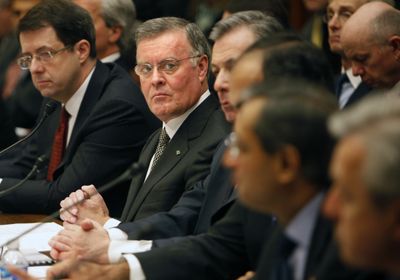Congress grills bailed-out bankers
Some financiers testify they don’t expect to need more

WASHINGTON – The titans of Wall Street, already humbled by the financial meltdown, were hauled before Congress for the first time Wednesday to face the rage of a nation.
Lined up in a row at a nationally-televised hearing, the chieftains of eight banks that received $165 billion in federal bailout funds were pounded with ferocious questions from lawmakers demanding to know whether the firms were misusing taxpayer dollars.
“I feel more like corporal of the universe, not captain of the universe at the moment,” said a sheepish Kenneth Lewis, chief executive of Bank of America.
By turns apologetic, defensive and yet hopeful they could survive the financial crisis, the executives tried to reassure the committee that they were using the bailout money to increase lending to consumers and to convince the public that they understood the depth of anger over the crisis.
The seven-hour hearing before the House Financial Services Committee was not just a public pillorying of the executives. It was also a trial for the government’s initial $700 billion bailout just as the Obama administration tries to win support for its vision of how to stabilize the financial system.
None of the chief executives told the panel they needed more government funds. Seven said they didn’t expect to request more federal money, with only Vikram Pandit of Citigroup saying it would depend on the details of the plan. Several executives said they never wanted even the first installment of the bailout money.
“For anyone who contends that you do not need the money and that you did not ask for it, please find a way to return that money to the Treasury before you leave town,” said an exasperated Rep. Paul Kanjorski, D-Pa. None of the executives took him up on the offer.
The Wall Street chiefs’ testimony amounted to their most full-throated response to criticism from lawmakers and analysts that the banks are hoarding the bailout money instead of lending it out as Congress intended. J.P. Morgan Chase chief executive Jamie Dimon, for example, said his firm made $150 billion in new loans in the final quarter of 2008, with consumer loan balances jumping by 2.1 percent over the previous quarter even as consumer spending dropped.
“Make no mistake: We are still lending, and we are lending far more because of the TARP,” said Lewis, of Bank of America, using the acronym for the bailout’s formal title, the Troubled Assets Relief Program.
Wells Fargo chief executive John Stumpf said his firm was working to lend to qualified applicants. “We make money when we make loans,” he said. “That’s our business.”
The bank executives were also grilled on their compensation packages and bonuses, with lawmakers demanding that they each recite their salaries (from $600,000 to $1.5 million) and their bonuses (zero for all). Pandit said he volunteered to take a $1 yearly salary until the company returned to profitability.
“Let me be clear with the committee: I get the new reality and I will make sure Citi gets it as well,” he said.
The financiers were contrite and accepted part of the blame for the economic crisis.
“As an industry, clearly, we made mistakes,” said Morgan Stanley chief executive John Mack. “I think the entire industry shares some of that responsibility and for that, we are sorry for it.”